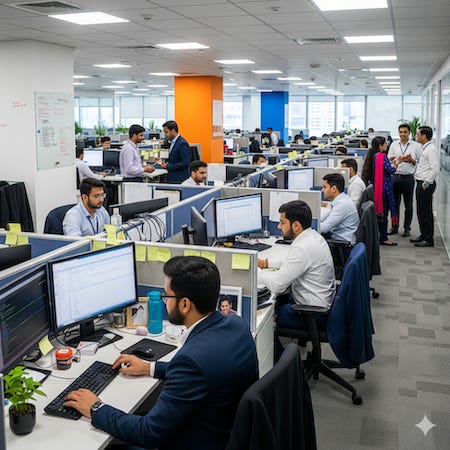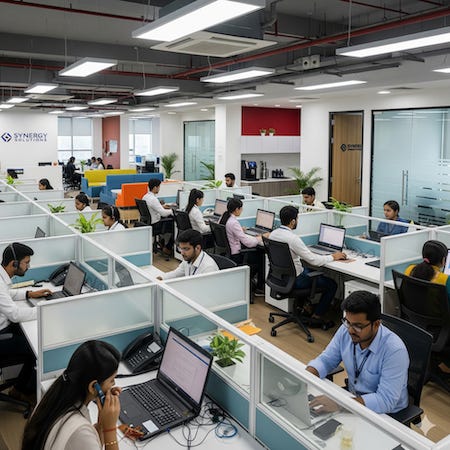Recently, the US introduced a bill.
It proposes a tariff on outsourcing IT functions.
And this has shaken the Indian IT sector — at least a bit.
Some of the biggest companies on the Indian stock markets are IT companies.
TCS, Infosys, Wipro, LTIMindtree, to name a few.
TCS has over 6 lakh employees. Infosys has over 3 lakh.
After financial services, the IT sector is the 2nd biggest industry on the Indian stock markets.
A tariff on outsourcing could potentially affect these companies’ revenues in a meaningful way.
The Indian IT Sector
The Indian IT sector operates very much like manufacturing companies.
The difference being that they don’t make tangible products. They make software services instead.
In today’s age, practically every company needs software services that are designed and suited to their purpose.
These IT companies build and maintain those software.
A technology company like Amazon would not need external help for software.
But a company like Coca Cola or Ford will ask an IT company for help.
The clients are not just companies, they are governments and other organisations too.
Making a passport in India used to be a long and time-consuming task. These days, it happens within days.
The entire passport service was migrated from a paper-based model to a software-based model.
Now, everything happens much faster. That system was built by TCS.
Similarly, income tax filing has become much easier than before. That system is the work of Infosys.
No matter which giant company you think about, they all need IT services.
Supply chain companies, financial services companies, manufacturing companies, consumer and retail companies, defence companies, FMCG giants, and many more rely on Indian IT services for their operations.
Obviously, these software need to keep changing from time to time. So these need to be maintained.
Usually, the IT services company and the client company sign an agreement which includes the software service, its maintenance, and scalability.
These contracts are the bread and butter of IT services companies.
Not all contracts have maintenance in them. Some are just about building and delivering software.
The services they offer can be extremely vast.
Building databases, websites, apps, internal tools, employee management systems, customised artificial intelligence products, IoT, data analysis, cloud services, cyber-security — anything to do with software used by other companies.
A large number of employees located in India do the bulk of the task.
These employees’ salaries are much lower than similarly skilled employees in western countries.
This difference allows IT companies to rapidly build software products and services while keeping costs very low — much like any manufacturing outsourcing company.
GCC
Global Capability Centres or GCCs are also IT service providers.
But they’re a bit different from the mainstream IT companies.
When many of these companies were getting their software-work done, they benefited and realised that they need the IT services long-term.
Some experimented with opening their own IT services companies.
Obviously, doing so within their own country would be expensive. So they opted for opening their own IT offices in India — where there are many software engineers.
These companies are called GCCs.
You would be surprised by the number of GCCs present in India.
Many companies that don’t even do business in India have GCCs in India.
Microsoft, Google, Amazon, Goldman Sachs, HSBC, Bosch, Walmart, Boeing, Airbus, Mercedes, Nvidia are only some names.
These GCCs are not only providing IT services, they are also starting to pioneer new research and products.
They are going from being the back office to a contributor towards future products and revenues.
Worry
The worry for both IT services companies and companies with GCCs is that the US has introduced a bill called HIRES Act.
It proposes a 25% tariff on outsourcing jobs and functions to foreign (non US) employees/contractors.
Their argument is that this will increase jobs in the US and reduce money flowing out of the country.
They want to keep the jobs, the skill, the money, and the offices within their borders.
Obviously, there are many arguments for and against it.
Many argue that this will ensure companies hire within America; that it will lead to increased jobs and skill development over time.
Theoretically, since more functions will happen within the US, it will lead to more stability and reduced geopolitical risk for the US.
The counter-argument to that is that it will lead to higher costs for the end-customer as American workers’ salaries are higher.
Another argument is that there simply aren’t enough skilled workers in America to do all of these jobs.
Many American companies operate globally and laws like this can hamper their operations, growth, and innovation.
This bill has not passed yet.
It is possible that the bill will be changed before being passed.
So we don’t know how things will turn out.
Besides, Indian IT companies also operate in other parts of the world. It’s not like the US is the only market.
Europe, the Middle East, the UK, Asia Pacific: all regions contribute to their revenues.
But it still is a sizeable market.
Indian IT sector investors are cautious. While the stock prices are fine for now, this news does make investors a bit nervous.
The Indian IT sector sees profit margins in the range of 15 to 25%, which is much higher than many other industries.
They have been regular with dividends and buybacks making them darlings of investors.
Both Indian and American companies are likely to push back since they benefit from outsourcing to IT companies and GCCs.
As with many decisions in these times — there is uncertainty.
The Indian IT sector has shown resilience over the decades.
Some of these have been monumental challenges: advent of cloud, data analytics and machine learning, Dotcom bust, 2008 recession, and geopolitical risks.
LLM and generative AI are yet another new challenge they’re dealing with.
There is no guarantee that the sector will continue to win against newer challenges.
This is why many investors and fund managers are talking about the IT sector so much.
They are fearful something bad might happen.
But then, nothing might happen too.
And even if something does happen, they are optimistic that the sector will survive this shock too.
It is an interesting space to watch over the next few months.
Quick Takes
+ Foreign portfolio investors (FPIs) sold Indian stocks worth $4 billion in August. This is the biggest outflow in 7 months, mainly due to the US tariffs on Indian exports and the falling Rupee.
+ India and Israel signed a Bilateral Investment Treaty (BIT), to boost investments and pave the way for a potential Free Trade Agreement (FTA).
+ PhysicsWallah filed an updated Draft Red Herring Prospectus (DRHP) with SEBI for a Rs 3,820 crore IPO.
+ Jane Street’s appeal against SEBI in the market manipulation case began today. The Securities Appellate Tribunal (SAT) has ordered SEBI to respond before 18 Nov.
+ The government has allowed companies to revise the MRPs on unsold stock to reflect the new GST rates, using stickers or stamps. This relief will be valid till 31 Dec 2025.
+ The government approved Rs 4,447 crore to build a 4-lane greenfield 82 km Mokama-Munger expressway section of the Buxar-Bhagalpur corridor.
+ China’s consumer inflation fell 0.4% year-on-year in August (vs no change in July).
+ The USA’s inflation rate rose to 2.9% year-on-year in August (vs 2.7% in July). Core inflation (excluding volatile items) remained steady at 3.1%.
+ SEBI has simplified compliance for Foreign Portfolio Investors (FPIs) investing only in government securities, to attract foreign investment. The changes will be effective from 8 Feb 2026.
+ India’s consumer inflation rose to 2.07% year-on-year in August (vs 1.61% in July).
+ India’s forex reserves rose $4.03 billion to $698.2 billion in the week that ended on 5 Sept.
+ Urban Company IPO was subscribed 103.63 times. Retail subscription: 39.25 times. IPO is closed for subscription.
The information contained in this Groww Digest is purely for knowledge. This Groww Digest does not contain any recommendations or advice.
Team Groww Digest



